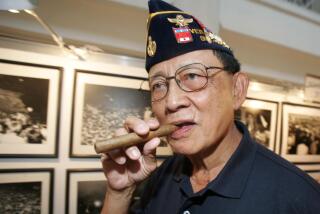Dulcesimo Habal; Filipino American Hero in World War II
- Share via
Dulcesimo Habal, a Filipino American hero of World War II who earned the Distinguished Service Cross, the U.S. Army’s second-highest medal for heroism, for alerting half a million sleeping members of the resistance to invading Japanese, has died at age 86.
Habal, who retired from the Army as a major in 1965, died Aug. 6 in his son’s Carson home. He had suffered from diabetes and had become increasingly frail the last few years.
Born in Casiguran in the Philippines long before the archipelago was granted independence, Habal in 1935 joined the Philippine Scouts, an elite corps fighting under U.S. Army command. By the time war broke out, he was a sergeant working as a radio operator.
Although his company had retreated from the invading Japanese, Habal and his radio remained behind enemy lines. On his heroic day in January 1942, he forded three rivers where bridges had been blown up and frequently heard gunfire. But he was able to radio his warning to his comrades.
“Had it not been for my radio,” Habal told The Times in 1998, “they would have been massacred by the Japanese.”
Habal continued fighting on the Bataan Peninsula until the Americans were defeated four months later at Corregidor. After the U.S. troops left, he was taken prisoner and prodded along on the infamous 60-mile Bataan death march, which claimed 10,000 lives.
“If you couldn’t walk, they’d get the bayonet and kill you right there,” he recalled in 1998.
But Habal escaped during the trek toward the Japanese internment camp and joined guerrillas for the duration of the war. He was officially listed as missing in action from 1942 to 1945.
Habal served in the Korean War and then moved his family to San Pedro. While stationed at Ft. MacArthur, Habal earned degrees in electronics engineering, at Harbor Junior College and Cal State Long Beach so he could get a “good civilian job” after his military retirement.
“America is the only place in the world,” he told The Times in 1954, “where we as a family can be educated without being wealthy.”
Commissioned a major, Habal later moved to Monterey, where he was an instructor at Ft Ord until his retirement in 1965.
In addition to the Distinguished Service Cross, Habal earned a Bronze Star, a distinguished unit citation with two oak leaf clusters and a combat infantryman badge with two stars, among other awards.
In 1998, he was among several decorated Pacific Islanders and Asian Americans whose records were reviewed for possible receipt of the Medal of Honor. Inspired by a similar reexamination of military heroism of blacks, Sen. Daniel K. Akaka (D-Hawaii) suggested that many worthy Filipinos and others might have been overlooked because of racial discrimination. Of more than 150,000 Pacific Islanders and Asian Americans fighting under the U.S. command in World War II, only one Japanese American and one Filipino received the top medal.
“I’m nearly dead,” Habal told The Times ruefully when Akaka’s effort was launched. “It would be hard to enjoy it at this late age. It’s something that should have been done a long time ago.”
Habal’s first wife, Aurora, died in 1984, and his second wife, Filipinas, died in 1996. He is survived by his son, Napoleon; five daughters, Zenaida Bactad of Carmel, Muriel Miller of Carmel Valley, Erlinda Franklin of Seaside, Estella Oberzinger of Palo Alto and Raquel Mahoney of Mesa, Ariz.; 20 grandchildren; and eight great-grand-children.
More to Read
Sign up for Essential California
The most important California stories and recommendations in your inbox every morning.
You may occasionally receive promotional content from the Los Angeles Times.













